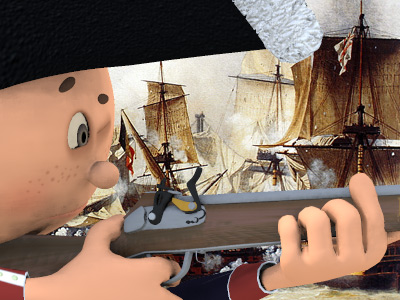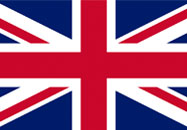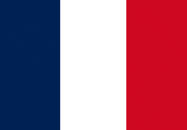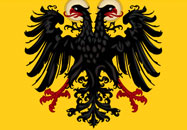Napoleonic Wars (1803-1815)
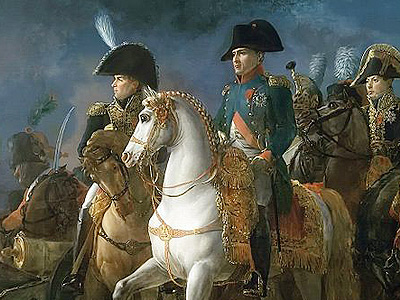
Overview of Napoleonic Wars
Napoleon seized power in 1799, creating a de facto military dictatorship. There are a number of opinions on the date to use as the formal beginning of the Napoleonic Wars; 18 May 1803 is often used, when Britain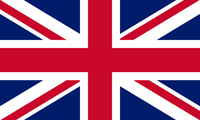 The United Kingdom of Great Britain and Ireland was a sovereign state in Northwestern Europe that comprised the entirety of the British Isles between 1801 and 1922. The United Kingdom, having financed the European coalition that defeated France during the Napoleonic Wars, developed a large Royal Navy that enabled the British Empire to become the foremost world power for the next century. and France ended the only short period of peace between 1792 and 1814. The Napoleonic Wars began with the War of the Third Coalition, which was the first of the Coalition Wars against the First French Republic
The United Kingdom of Great Britain and Ireland was a sovereign state in Northwestern Europe that comprised the entirety of the British Isles between 1801 and 1922. The United Kingdom, having financed the European coalition that defeated France during the Napoleonic Wars, developed a large Royal Navy that enabled the British Empire to become the foremost world power for the next century. and France ended the only short period of peace between 1792 and 1814. The Napoleonic Wars began with the War of the Third Coalition, which was the first of the Coalition Wars against the First French Republic In the history of France, French First Republic, sometimes referred to in historiography as Revolutionary France, and officially the French Republic, was founded on 21 September 1792 during the French Revolution. The First Republic lasted until the declaration of the First Empire on 18 May 1804 under Napoléon Bonaparte, although the form of the government changed several times. after Napoleon's accession as leader of France.
In the history of France, French First Republic, sometimes referred to in historiography as Revolutionary France, and officially the French Republic, was founded on 21 September 1792 during the French Revolution. The First Republic lasted until the declaration of the First Empire on 18 May 1804 under Napoléon Bonaparte, although the form of the government changed several times. after Napoleon's accession as leader of France.
Britain ended the Treaty of Amiens and declared war on France in May 1803; one reason for this was Napoleon's changes to the international system in Western Europe, especially in Switzerland, Germany, Italy and the Netherlands. Kagan argues that Britain was irritated in particular by Napoleon's assertion of control over Switzerland. Furthermore, Britons felt insulted when Napoleon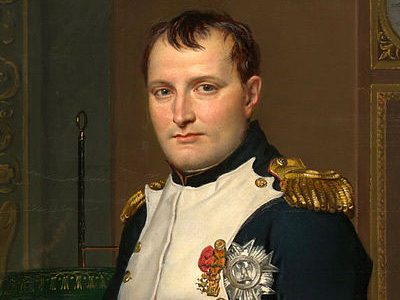 Napoleon Bonaparte (1769-1821), was a French military and political leader who rose to prominence during the French Revolution and led several successful campaigns during the French Revolutionary Wars. As Napoleon I, he was Emperor of the French from 1804 until 1814, and again in 1815. One of the greatest commanders in history, his wars and campaigns are studied at military schools worldwide. Napoleon Bonaparte » stated that their country deserved no voice in European affairs, even though King George III was an elector of the Holy Roman Empire
Napoleon Bonaparte (1769-1821), was a French military and political leader who rose to prominence during the French Revolution and led several successful campaigns during the French Revolutionary Wars. As Napoleon I, he was Emperor of the French from 1804 until 1814, and again in 1815. One of the greatest commanders in history, his wars and campaigns are studied at military schools worldwide. Napoleon Bonaparte » stated that their country deserved no voice in European affairs, even though King George III was an elector of the Holy Roman Empire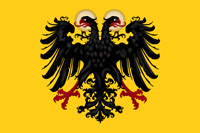 The Holy Roman Empire was a political entity in Western, Central, and Southern Europe that developed during the Early Middle Ages and continued until its dissolution in 1806 during the Napoleonic Wars. From the accession of Otto I in 962 until the twelfth century, the Empire was the most powerful monarchy in Europe. The empire reached the apex of territorial expansion and power in the mid-thirteenth century, but overextending led to partial collapse.. For its part, Russia
The Holy Roman Empire was a political entity in Western, Central, and Southern Europe that developed during the Early Middle Ages and continued until its dissolution in 1806 during the Napoleonic Wars. From the accession of Otto I in 962 until the twelfth century, the Empire was the most powerful monarchy in Europe. The empire reached the apex of territorial expansion and power in the mid-thirteenth century, but overextending led to partial collapse.. For its part, Russia Russian Empire was an empire and the final period of the Russian monarchy from 1721 to 1917, ruling across large parts of Eurasia. The rise of the Russian Empire coincided with the decline of neighbouring rival powers: the Swedish Empire, the Polish–Lithuanian Commonwealth, Qajar Iran, the Ottoman Empire, and Qing China. Russia remains the third-largest empire in history, surpassed only by the British Empire and the Mongol Empire. decided that the intervention in Switzerland indicated that Napoleon was not looking toward a peaceful resolution of his differences with the other European powers.
Russian Empire was an empire and the final period of the Russian monarchy from 1721 to 1917, ruling across large parts of Eurasia. The rise of the Russian Empire coincided with the decline of neighbouring rival powers: the Swedish Empire, the Polish–Lithuanian Commonwealth, Qajar Iran, the Ottoman Empire, and Qing China. Russia remains the third-largest empire in history, surpassed only by the British Empire and the Mongol Empire. decided that the intervention in Switzerland indicated that Napoleon was not looking toward a peaceful resolution of his differences with the other European powers.
The British quickly enforced a naval blockade of France to starve it of resources. Napoleon responded with economic embargoes against Britain, and sought to eliminate Britain's Continental allies to break the coalitions arrayed against him. The so-called Continental System formed a league of armed neutrality to disrupt the blockade and enforce free trade with France. The British responded by capturing the Danish fleet, breaking up the league, and later secured dominance over the seas, allowing it to freely continue its strategy. Napoleon won the War of the Third Coalition at Austerlitz, forcing the Austrian Empire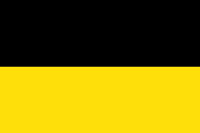 Austrian Empire was a Central-Eastern European and multinational great power from 1804 to 1867, created by proclamation out of the realms of the Habsburgs. During its existence, it was the third most populous monarchy in Europe after the Russian Empire and the United Kingdom. Along with Prussia, it was one of the two major powers of the German Confederation. The empire was proclaimed by Francis II in 1804 in response to Napoleon's declaration of the First French Empire. out of the war, formally dissolving the Holy Roman Empire. Within months, Prussia
Austrian Empire was a Central-Eastern European and multinational great power from 1804 to 1867, created by proclamation out of the realms of the Habsburgs. During its existence, it was the third most populous monarchy in Europe after the Russian Empire and the United Kingdom. Along with Prussia, it was one of the two major powers of the German Confederation. The empire was proclaimed by Francis II in 1804 in response to Napoleon's declaration of the First French Empire. out of the war, formally dissolving the Holy Roman Empire. Within months, Prussia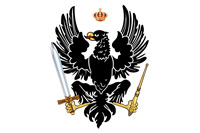 The Kingdom of Prussia was a German kingdom that constituted the state of Prussia between 1701 and 1918. It was the driving force behind the unification of Germany in 1871 and was the leading state of the German Empire until its dissolution in 1918. Although it took its name from the region called Prussia, it was based in the Margraviate of Brandenburg. Its capital was Berlin. declared war, triggering a War of the Fourth Coalition. This war ended disastrously for Prussia, defeated and occupied within 19 days of the campaign's beginning. Napoleon subsequently defeated the Russian Empire at Friedland, creating powerful client states in Eastern Europe, ending the fourth coalition.
The Kingdom of Prussia was a German kingdom that constituted the state of Prussia between 1701 and 1918. It was the driving force behind the unification of Germany in 1871 and was the leading state of the German Empire until its dissolution in 1918. Although it took its name from the region called Prussia, it was based in the Margraviate of Brandenburg. Its capital was Berlin. declared war, triggering a War of the Fourth Coalition. This war ended disastrously for Prussia, defeated and occupied within 19 days of the campaign's beginning. Napoleon subsequently defeated the Russian Empire at Friedland, creating powerful client states in Eastern Europe, ending the fourth coalition.
Concurrently, Portugal's refusal to commit to the Continental System, and Spain's failure to maintain it, led to the Peninsular War, and the outbreak of a War of the Fifth Coalition. The French occupied Spain and formed a Spanish client kingdom, ending the alliance between the two. Heavy British involvement in the Iberian Peninsula soon followed, while a British effort to capture Antwerp failed. Napoleon oversaw the situation in Iberia, defeating the Spanish, and expelling the British from the Peninsula. Austria, keen to recover territory lost during the War of the Third Coalition, invaded France's client states in Eastern Europe. Napoleon defeated the fifth coalition at Wagram.
Attempts to disrupt the British blockade led to the United States declaring war on Britain, while grievances over control of Poland, and Russia's withdrawal from the Continental System, led to Napoleon invading Russia in June 1812. The invasion was an unmitigated disaster for Napoleon; scorched earth tactics, desertion, French strategic failures and the onset of the Russian winter compelled Napoleon to retreat with massive losses. Napoleon suffered further setbacks; French power in the Iberian Peninsula was broken at Battle of Vitoria the following summer, and a new coalition began the War of the Sixth Coalition.
The coalition defeated Napoleon at Leipzig, precipitating his fall from power and eventual abdication on April 6, 1814. The victors exiled Napoleon to Elba and restored the Bourbon monarchy. Napoleon escaped from Elba in 1815, gathering enough support to overthrow the monarchy of Louis XVIII, triggering a seventh, and final, coalition against him. Napoleon was decisively defeated at Waterloo, and he abdicated again on 22 June. On 15 July, he surrendered to the British at Rochefort, and was exiled to Saint Helena, where he died in 1821. The Treaty of Paris, signed on 20 November 1815, formally ended the war.
The Bourbon monarchy was restored once more, and the victors began the Congress of Vienna, to restore peace to the continent. As a direct result of the war, the Kingdom of Prussia rose to become a great power on the continent, while the United Kingdom became the world's dominant superpower, beginning the Pax Britannica. The Holy Roman Empire was dissolved, and the philosophy of nationalism, that emerged early in the war, greatly contributed to the later unification of the German states, and those of the Italian peninsula. The war in Iberia greatly weakened Spanish power, and the Spanish Empire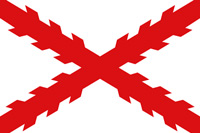 The Spanish Empire was a colonial empire governed by Spain and its predecessor states between 1492 and 1976. One of the largest empires in history, it was the first to usher the European Age of Discovery and achieve a global scale, controlling vast territory. It was one of the most powerful empires of the early modern period, reaching its maximum extent in the 18th century. began to unravel; Spain
The Spanish Empire was a colonial empire governed by Spain and its predecessor states between 1492 and 1976. One of the largest empires in history, it was the first to usher the European Age of Discovery and achieve a global scale, controlling vast territory. It was one of the most powerful empires of the early modern period, reaching its maximum extent in the 18th century. began to unravel; Spain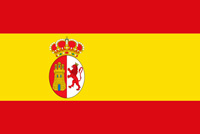 Spain or the Kingdom of Spain, is a country primarily located in southwestern Europe with parts of territory in the Atlantic Ocean and across the Mediterranean Sea. A major country of the Age of Discovery, Spain began the colonization of the New World in 1492 developing one of the largest empires in history and underpinned the emergence of a global trading system primarily fuelled by precious metals. would lose nearly all of its American possessions by 1833. The Portuguese Empire began a rapid decline, with Brazil declaring independence in 1822.
Spain or the Kingdom of Spain, is a country primarily located in southwestern Europe with parts of territory in the Atlantic Ocean and across the Mediterranean Sea. A major country of the Age of Discovery, Spain began the colonization of the New World in 1492 developing one of the largest empires in history and underpinned the emergence of a global trading system primarily fuelled by precious metals. would lose nearly all of its American possessions by 1833. The Portuguese Empire began a rapid decline, with Brazil declaring independence in 1822.
The wars revolutionised European warfare; the application of mass conscription and total war led to campaigns of unprecedented scale, as whole nations committed all their economic and industrial resources to a collective war effort. Tactically, the French Army redefined the role of artillery, while Napoleon emphasised mobility to offset numerical disadvantages, and aerial surveillance was used for the first time in warfare. While not a new tactic, the highly successful Spanish guerrillas demonstrated the capability of a people driven by fervent nationalism, liberalism and religious fundamentalism against an occupying force. Due to the longevity of the wars, and the extent of Napoleon's conquests, the ideals of the French Revolution had a massive impact on European social culture; many subsequent revolutions, such as that of Russia, looked to the French as their source of inspiration, while its core founding tenets greatly expanded the arena of Human rights and shaped modern political philosophies in use today.
Background
The outbreak of the French Revolution had been received with great alarm by the rulers of Europe's continental powers, which had been further exacerbated by the execution of Louis XVI of France, and the overthrow of the French monarchy. In 1793, the Austrian Empire, the Kingdom of Sardinia, the Kingdom of Naples, Prussia, the Spanish Empire, and the Kingdom of Great Britain formed the First Coalition to curtail the growing unrest in France. Measures such as mass conscription, military reforms, and total war allowed France to defeat the coalition, despite the concurrent civil war in France. Napoleon, then a general in the French army, forced the Austrians to sign the Treaty of Campo Formio, leaving only Great Britain opposed to the fledgling French Republic.
A Second Coalition formed in 1798 by Great Britain, Austria, Naples, the Ottoman Empire, the Papal States, Portugal, Russia, and Sweden. The French Republic, under the Directory, suffered from heavy levels of corruption and internal strife. The new republic also lacked funds, and no longer enjoyed the services of Lazare Carnot, the minister of war who had guided France to its victories during the early stages of the Revolution. Bonaparte, commander of the Armée d'Italie in the latter stages of the First Coalition, had launched a campaign in Egypt, intending to disrupt the British economic powerhouse of India. Pressed from all sides, the Republic suffered a string of successive defeats against revitalised enemies, supported by Britain's financial help.
Napoleon returned to France from Egypt on 23 August 1799, his campaign there having failed. He seized control of the French government on 9 November, in a bloodless coup d'état, replacing the Directory with the Consulate and transforming the republic into a de facto dictatorship. He further reorganised the French military forces, establishing a large reserve army positioned to support campaigns on the Rhine or in Italy. Russia had already been knocked out of the war, and, under Napoleon's leadership, the French decisively defeated the Austrians in June 1800, crippling Austrian capabilities in Italy. Austria was definitively defeated that December, by Moreau's forces in Bavaria. The Austrian defeat was sealed by the Treaty of Lunéville early the following year, further compelling the British to sign the Treaty of Amiens with France, establishing a tenuous peace.
Start date and nomenclature
No consensus exists as to when the French Revolutionary Wars ended and the Napoleonic Wars began. Possible dates include 9 November 1799, when Bonaparte seized power on 18 Brumaire in France; 18 May 1803, when Britain and France ended the one short period of peace between 1792 and 1814; or 2 December 1804, when Bonaparte crowned himself Emperor.
British historians occasionally refer to the nearly continuous period of warfare from 1792 to 1815 as the Great French War, or as the final phase of the Anglo-French Second Hundred Years' War, spanning the period 1689 to 1815. Historian Mike Rapport (2013) suggested to use the term "French Wars" to unambiguously describe the entire period from 1792 to 1815.
In France, the Napoleonic Wars are generally integrated with the French Revolutionary Wars: Les guerres de la Révolution et de l'Empire.
German historiography may count the War of the Second Coalition (1798/9 – 1801/2), during which Napoleon seized power, as the Erster Napoleonischer Krieg ("First Napoleonic War").
In Dutch historiography, it is common to refer to the seven major wars between 1792 and 1815 as the Coalition Wars (coalitieoorlogen), referring to the first two as the French Revolution Wars (Franse Revolutieoorlogen).
Napoleon's tactics
Napoleon was, and remains, famous for his battlefield victories, and historians have spent enormous attention in analysing them. In 2008, Donald Sutherland wrote:
The ideal Napoleonic battle was to manipulate the enemy into an unfavourable position through manoeuvre and deception, force him to commit his main forces and reserve to the main battle and then undertake an enveloping attack with uncommitted or reserve troops on the flank or rear. Such a surprise attack would either produce a devastating effect on morale, or force him to weaken his main battle line. Either way, the enemy's own impulsiveness began the process by which even a smaller French army could defeat the enemy's forces one by one.
After 1807, Napoleon's creation of a highly mobile, well-armed artillery force gave artillery usage increased tactical importance. Napoleon, rather than relying on infantry to wear away the enemy's defences, could now use massed artillery as a spearhead to pound a break in the enemy's line. Once that was achieved he sent in infantry and cavalry.
Prelude
Britain was irritated by several French actions following the Treaty of Amiens. Bonaparte had annexed Piedmont and Elba, made himself President of the Italian Republic, a state in northern Italy that France had set up, and failed to evacuate Holland. France continued to interfere with British trade despite peace having been made and complained about Britain harbouring certain individuals and not cracking down on the anti-French press. In fighting, Napoleon focused on penetration, gaining a central position, and surrounding small groups of enemy forces. To Napoleon, penetration meant "You engage, and then you wait and see." Central Positioning aimed to divide enemy forces into weaker smaller groups.
Malta had been captured by Britain during the war and was subject to a complex arrangement in the 10th article of the Treaty of Amiens where it was to be restored to the Knights of St. John with a Neapolitan garrison and placed under the guarantee of third powers. The weakening of the Knights of St. John by the confiscation of their assets in France and Spain along with delays in obtaining guarantees prevented the British from evacuating it after three months as stipulated in the treaty.
The Helvetian Republic had been set up by France when they invaded Switzerland in 1798. France had withdrawn its troops, but violent strife broke out against the government, which many Swiss saw as overly centralised. Bonaparte reoccupied the country in October 1802 and imposed a compromise settlement. This caused widespread outrage in Britain, which protested that this was a violation of the Treaty of Lunéville. Although continental powers were unprepared to act, the British decided to send an agent to help the Swiss obtain supplies, and also ordered their military not to return Cape Colony to Holland as they had committed to do so in the Treaty of Amiens.
Swiss resistance collapsed before anything could be accomplished, and after a month Britain countermanded the orders not to restore Cape Colony. At the same time Russia finally joined the guarantee with regards to Malta. Concerned that there would be hostilities when Bonaparte found out that Cape Colony had been retained, the British began to procrastinate on the evacuation of Malta. In January 1803 a government paper in France published a report from a commercial agent which noted the ease with which Egypt could be conquered. The British seized on this to demand satisfaction and security before evacuating Malta, which was a convenient stepping stone to Egypt. France disclaimed any desire to seize Egypt and asked what sort of satisfaction was required but the British were unable to give a response. There was still no thought of going to war; Prime Minister Addington publicly affirmed that Britain was in a state of peace.
In early March 1803 the Addington ministry received word that Cape Colony had been re-occupied by the British army in accordance with the orders which had subsequently been countermanded. On 8 March they ordered military preparations to guard against possible French retaliation, and justified them by falsely claiming that it was only in response to French preparations and that they were conducting serious negotiations with France. In a few days it was known that Cape Colony had been surrendered in accordance with the counter-orders, but it was too late. Bonaparte berated the British ambassador in front of 200 spectators over the military preparations.
The Addington ministry realised they would face an inquiry over their false reasons for the military preparations, and during April unsuccessfully attempted to secure the support of William Pitt the Younger to shield them from damage. In the same month the ministry issued an ultimatum to France demanding the retention of Malta for at least ten years, the permanent acquisition of the island of Lampedusa from the Kingdom of Sicily, and the evacuation of Holland. They also offered to recognise French gains in Italy if they evacuated Switzerland and compensated the King of Sardinia for his territorial losses. France offered to place Malta in the hands of Russia to satisfy British concerns, pull out of Holland when Malta was evacuated, and form a convention to give satisfaction to Britain on other issues. The British falsely denied that Russia had made an offer and their ambassador left Paris. Desperate to avoid war, Bonaparte sent a secret offer where he agreed to let Britain retain Malta if France could occupy the Otranto peninsula in Naples. All efforts were futile and Britain declared war on 18 May 1803.
HISTORY
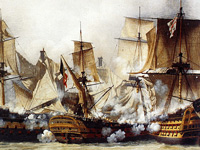
RESOURCES
This article uses material from the Wikipedia article "Napoleonic Wars", which is released under the Creative Commons Attribution-Share-Alike License 3.0.
© Stories Preschool. All Rights Reserved.
